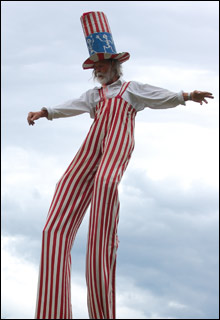
DADDY LONG LEGS: Peter Schumann, 74,
is the father/founder of Bread and Puppet
Theater, and is one of America’s greatest
living artists |
Nestled in the verdant mountain valley of Glover, Vermont, way up in the northern part of the state, is a farm of rolling meadows, pine forests, and gray barns, all under vast skies. It’s the home base of Bread and Puppet Theater, the landmark political troupe that has been pricking US presidents and policies with a unique brand of street theater since John F. Kennedy was in office. The theater has been resurgent since George W. Bush took the reigns in 2000, so I ask founder Peter Schumann, now that the ghastly Bush era is mercifully lurching to its end, what’s next? “To protest the new era that’s coming after the Bush era,” he says in his native German accent, “which is the same era as the Bush era.”Schumann warns of a continuing era of gluttonous, bullying American consumerism, no matter who sits in the Oval Office. “It’s the sad late stages of this form of capitalism that can’t possibly be longer with us,” he says. “That will kill us for sure. . . . It just doesn’t work.” And he dismisses the notion that the advisors to a potential Barack Obama administration would be much different: “The same old mass murderers that were responsible for incredible events in this world like East Timor or the starvation of the Iraqis during the [’90s] blockade.”
Such fiery rhetoric is evidence of the continuing radicalism of a theater born in New York in 1962, when the fledgling experimental troupe made its name protesting the Vietnam War with papier-mâché masks and giant puppets. Many imagine that’s where the theater ended. Others know it’s still active, but write it off as a quaint hippie relic.

Perhaps that’s because Bread and Puppet pulled itself off the art world’s radar by relocating to Vermont in 1970, far from major theaters and galleries. It pursued a rigorous but populist “cheap art,” the most magnificent expression of which was an annual epic outdoor summer pageant featuring casts of hundreds and audiences of tens of thousands at the Glover farm. This single giant weekend extravaganza was discontinued in 1998 — the crowds grew unmanageable and that year a man was killed in a fight — but since then, the theater has presented an annual series of smaller shows on summer weekends. Many in New England grew up seeing the performances, but often, upon reaching adulthood, came to dismiss them as fluff for children.
That is a shame, because Schumann, who turned 74 in June, is one of America’s greatest living artists, New England’s old master. This past summer, Holland Cotter of the New York Times described the Bread and Puppet Museum — featuring four decades of Schumann’s masks and puppets on view daily (and for free) in a 19th-century barn in Glover — as “one of the great sights of American art.” And the Bush administration has inspired one of the theater’s most vital periods: shows about the calamities of this decade serve as an exclamation point and a bookend to its seminal Vietnam work. (Another prominent recent theme in Schumann’s work involves his accusations of Israeli oppression in Palestine, claims which have sparked controversy and charges of anti-Semitism.)
Art as sacrament
Great political artists require great political events. The tragedies of 9/11, the Iraq War, indefinite detentions, and American torture fertilized major Bread and Puppet shows. They come back to me as a series of haunting, mournful, acid images: a bomb served to tuxedoed gents at a banquet table; Iraqi women carrying corpses through a forest; a body falling from a balcony and thumping onstage; twin buildings made of naked bodies shattered by an airplane made of naked bodies; a ship of soldiers sailing in quest of victory; a great white bird (a kite on poles carried by three runners) flying across a green field; a giant puppet climbing into the air, its body a banner illustrating a tale of gods destroying humanity from the Mayan Popol Vuh. This past winter, Schumann re-imagined Dante’s Inferno as a scene from Guantánamo — a narrator read an interrogation transcript while performers played with little puppets and banged a hammer.
The theater is a mix of lectures, papier-mâché sculptures, banners, music, experimental dance, seriousness, and humor— an integration of all arts. What sticks with me are the odd alchemical moments that leap over logic directly into emotion. The “bread” of the company’s name refers to home-baked loaves smeared with garlic aioli that it serves after each show. It signals the theater as ritual sacrament, as spiritual nourishment.
The theater’s influence is vast — from giant puppets that are now standard at street protests to the many companies that Bread and Puppet alums have founded across the Americas and Europe. Its most mainstream manifestation is in the shows of Julie Taymor, who briefly hung out with the theater in the early ’70s. (She stuck a soulless clone of the troupe into her ’60s musical review Across the Universe).